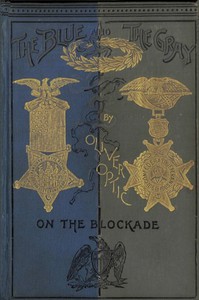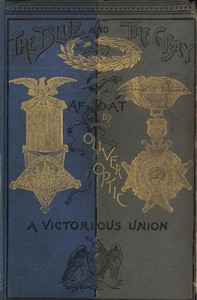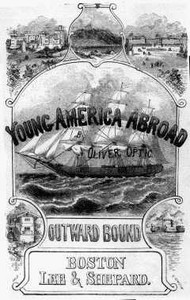On The Blockade, Oliver Optic [best affordable ebook reader txt] 📗

- Author: Oliver Optic
Book online «On The Blockade, Oliver Optic [best affordable ebook reader txt] 📗». Author Oliver Optic
"That is the kind of men we want, and at the present time, when we are hardly in a fighting latitude, perhaps I can use him as a copyist, if he will agree to make no use whatever of any information he may obtain in that capacity. I will speak to Mr. Nawood about the matter."
"Thank you, Captain Passford. Mulgrum is a very worthy man, patriotic in every fibre of his frame, and in every drop of his blood. I should be glad to obtain some permanent occupation for him in the service of his country, for nothing else will suit him in the present exciting times. Perhaps when you have tested his qualifications, this will make an opening for him."
"I will consider the subject tomorrow," said Christy, as he descended from the bridge.
The commander was satisfied that the portion of the conversation which had taken place between the aspirant for the position of captain's clerk and the second lieutenant and which had been finished before the steward had reached his perch on the foremast, related to this matter. Mulgrum had 96 heard the conversation between the first lieutenant and himself, which was intended to blind the listener, and he had reported it to his confederate. It was only another confirmation, if any were needed, in regard to the character of the conspirators.
Christy had no doubt in regard to the disloyalty of these two men; but nothing in respect to their ultimate intentions had yet been revealed. They had brought six seamen on board with them, and they appeared to have influence enough in some quarter to have had these men drafted into the Bronx. Eight men, even if two of them were officers, was an insignificant force, though he was willing to believe that they intended to obtain possession of the vessel in some manner. The captain returned to his cabin, and resumed his work in the state room.
Though Christy had spent several hours at his desk, he had really produced but a single letter, and had not yet finished it. When he heard eight bells strike, he left his state room, and seated himself at the table in the middle of his cabin. The door was open into the companion way. Mr. Flint presently appeared, and went on deck to 97 relieve the second lieutenant, who came below a few minutes later, though the captain did not allow himself to be seen by him. Then he closed the cabin door, and turned in, for he began to realize that he needed some rest. He went to sleep at once, and he did not wake till four bells struck in the morning. The Bronx was pitching heavily, though she still maintained her reputation as an easy-going ship in spite of the head sea. He dressed himself, and seated himself at his desk at once, devoting himself to the letter upon which he had been engaged the evening before. The second lieutenant was on duty at this time, and the first was doubtless asleep in his berth, but he had been below six hours during the night, and, calling Dave with his bell, he sent him for Mr. Flint, who presented himself a few minutes later.
"Good morning, Captain Passford; you have turned out early, sir," said the first lieutenant.
"Not very early, and I am sorry to wake you so soon. I did not turn in till after you had gone on deck to take the midwatch. I have been very busy since we parted, and I need your advice and assistance," replied the commander. "I have got at something."
98 "Indeed! I am glad to hear it," added Mr. Flint.
Without the loss of any time, the captain called Dave, who was at work in the ward room, and told him to see that no one came near the door of his cabin. The steward understood him perfectly, and Christy resumed his place at the table with the executive officer, and proceeded to detail to him as briefly as he could all the information he had obtained through Dave, and the manner of obtaining it. It required some time to do this, and the first lieutenant was intensely interested in the narrative.
"I am not greatly surprised so far as Lillyworth is concerned, for there has been something about him that I could not fathom since both of us came on board," said Mr. Flint.
"Of course these men are on board for a purpose, though I acknowledge that I cannot fathom this purpose, unless it be treason in a general sense; but I am inclined to believe that they have some specific object," added the captain. "Of course you will be willing to believe that both of these men are sailing under false colors."
"Undoubtedly. It has occurred to me that the 99 second lieutenant invented the name that represents him on the ship's books. Lillyworth is a little strained; if he had called himself Smith or Brown, it would have been less suspicious."
"In the conversation to which Dave listened on the bridge, both of them blundered, and let out their real names, though each of them reproved the other for doing so. The second lieutenant's real name is Pawcett, and that of the deaf mute is Hungerford."
"The last is decidedly a southern name, and the other may be for aught I know. Hungerford, Hungerford," said Mr. Flint, repeating the name several times. "It means something to me, but I can't make it out yet."
The first lieutenant cudgelled his brains for a minute or two as though he was trying to connect the name with some event in the past. The captain waited for him to sound his memory; but it was done in vain; Flint could not place him. He was confident, however, that the connection would be made in his mind at some other moment.
"The interesting question to us just now is to determine why these men, eight in number, are on board of the Bronx at all, and why they are on 100 board at the present time," said the captain. "I happen to know that Lillyworth was offered a better position than the one he now fills temporarily; but my father says he insisted on going in the Bronx."
"Certainly he is not here on a fool's errand. He has business on board of this particular steamer," replied Flint, speaking out of his musing mind. "Ah! now I have it!" he suddenly exclaimed. "Hungerford was the executive officer of the Killbright, or the Yazoo, as they called her afterwards. I had a very slight inkling that I had seen the face of the deaf mute before; but he has shaved off his beard, and stained his face, so that it is no wonder I did not identify him; but the name satisfies me that he was the first officer of the Yazoo."
"That means then that he is a regular officer of the Confederate navy," suggested the captain; "and probably Lillyworth is also. The only other name Dave was able to obtain was that of Spoors, one of the quartermasters; and very likely he is also another."
"We have almost a double crew on board, Captain Passford, and what can eight men do to capture this vessel?" asked Flint.
101 "I don't know what they intend to do, and I must give it up. Now I want to read a letter to you that I have written; and you can tell me what you think of it." The commander then read as follows from the sheet in his hand, upon which appeared no end of changes and corrections:
"To the Commander of any United States Ship of War, Sir:— The undersigned, master in the United States Navy, in temporary command of the United States Steamer Bronx, bound to the Gulf of Mexico, respectfully informs you that he has information, just received, of the approach to the coast of the southern states of two steamers, the Scotian and the Arran, believed to be fitted out as cruisers for the Confederate Navy. They will be due in these waters about March 17. They are of about five hundred tons each. A letter from the confidential agent of my father, Captain Horatio Passford, an agent in whom he has perfect confidence, both on account of his loyalty to his country undivided, and because of his skill as a shipmaster, contains this statement, which is submitted to you for your guidance: 'I have put twelve loyal American seamen, with an officer, on board of each of the steamers mentioned above; and they comprise about one-half of the crew of each vessel; and they will take possession of each of the two steamers when supported by any United States man-of-war. Warnock.'
Respectfully yours,
CHRISTOPHER PASSFORD,
Master Commanding."
102 "I beg your pardon, Captain Passford, but what under the canopy is that letter for?" asked Flint, not a little excited.
"It is for Pink Mulgrum to copy," replied the captain. "That is all the use I intend to make of it."
Flint leaned back in his chair and laughed heartily, and the commander could not help joining him.
103 CHAPTER IX A VOLUNTEER CAPTAIN'S CLERKMr. Flint was really amused at the plan of the commander of the Bronx, as indicated in the letter he had just read, and he was not laughing out of mere compliment to his superior officer, as some subordinates feel obliged to do even when they feel more like weeping. Perhaps no one knew Christy Passford so well as his executive officer, not even his own father, for Flint had been with him in the most difficult and trying ordeals of his life. He had been the young leader's second in command in the capture of the Teaser, whose cabin they now occupied, and they had been prisoners together. He had been amazed at his young companion's audacity, but he had always justified his action in the end. They had become excellent friends as well as associates in the navy, and there was a hearty sympathy between them.
Christy laughed almost in spite of himself, for 104 he had been giving very serious attention to the situation on board of the Bronx. In the ship's company were at least two officers on the other side of the great question of the day, both of them doubtless men of great experience in their profession, more mature in years than their opponent on this chess-board of fate, and they had come on board of the steamer to accomplish some important purpose. The game at which they were engaged had already become quite exciting, especially as it looked as if the final result was to be determined by strategy rather than hard fighting, for Pawcett and Hungerford could hardly expect to capture the Bronx with only a force of eight men.
"Mulgrum is to copy this letter," said Flint, suppressing his laughter.
"I have written the letter in order to have something for him to copy, and at the same time to give him and his confederate something to think about," replied Christy; and he could hardly help chuckling when he thought of the effect the contents of the letter would produce in the minds of those for whom the missive was really intended.
105 "Do you think they will swallow this fiction, Captain Passford?" asked the first lieutenant.
"Why shouldn't they swallow it, hook, bait, and sinker? They are Confederate agents beyond the possibility of a doubt; and they are looking for a ship in which they intend to ravage the commerce of the United States," replied Christy; and the question had done something to stimulate his reasoning powers. "They want a vessel, and the Bronx would suit them very well."
"But they will not attempt to capture her under present circumstances, I am very confident. They know that we have about twenty seamen extra on board."
"They know that certainly; but possibly they know some things in this connection that we do not know," added Christy, as he put his hand on his forehead, and leaned over the table, as though his mind were strongly exercised by some serious question he was unable to answer satisfactorily to himself.
"What can they know that we don't know in regard to this vessel?" demanded Flint, looking quite as serious as the commander.
106 "Whether our extra men are loyal or not," answered Christy, dropping his hand, and looking his companion full in the face.
"Do you think there is any doubt in regard to them?"
"I confess that I have not had a doubt till this moment," said the captain, wiping the perspiration from his brow, for





Comments (0)